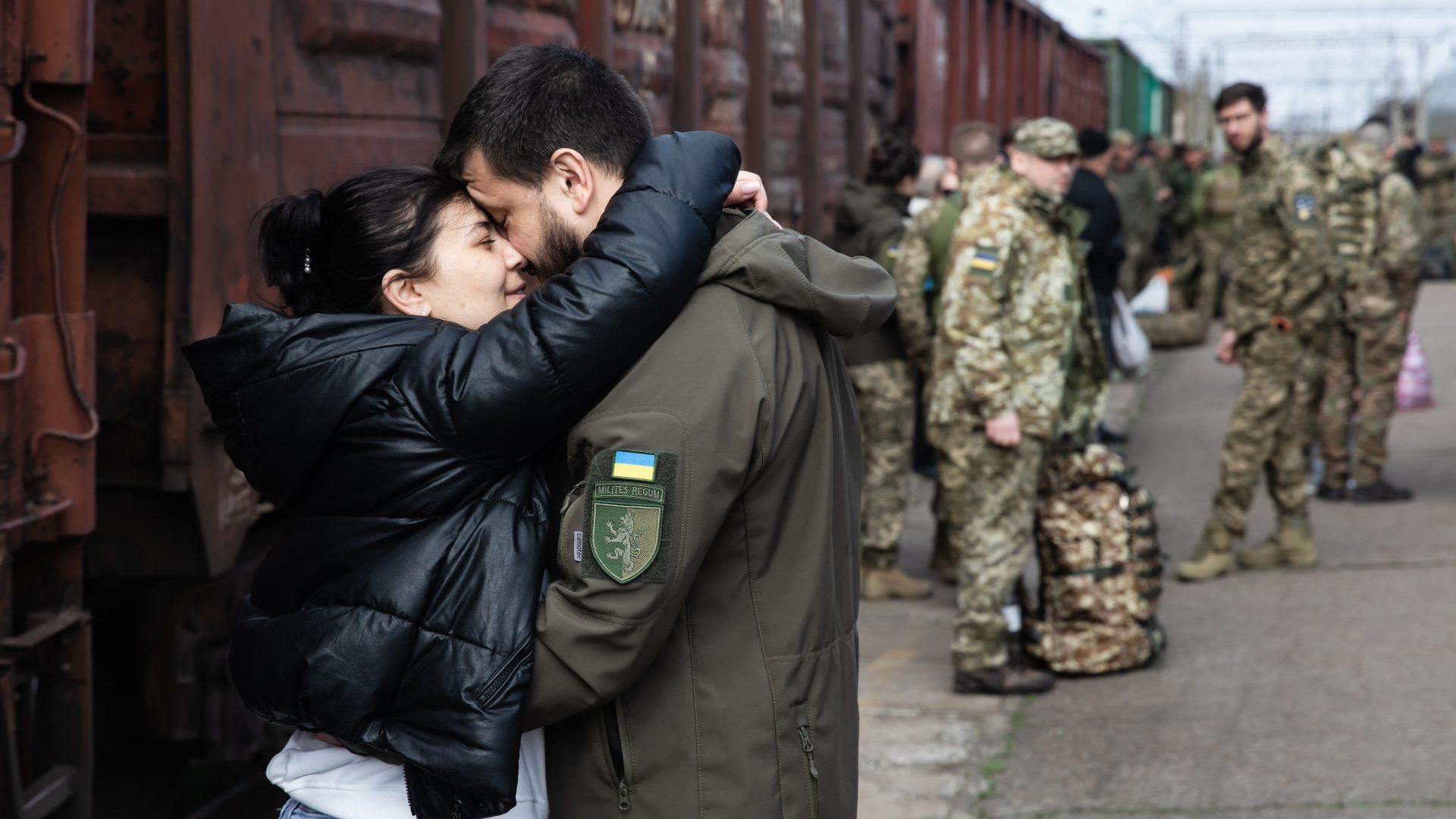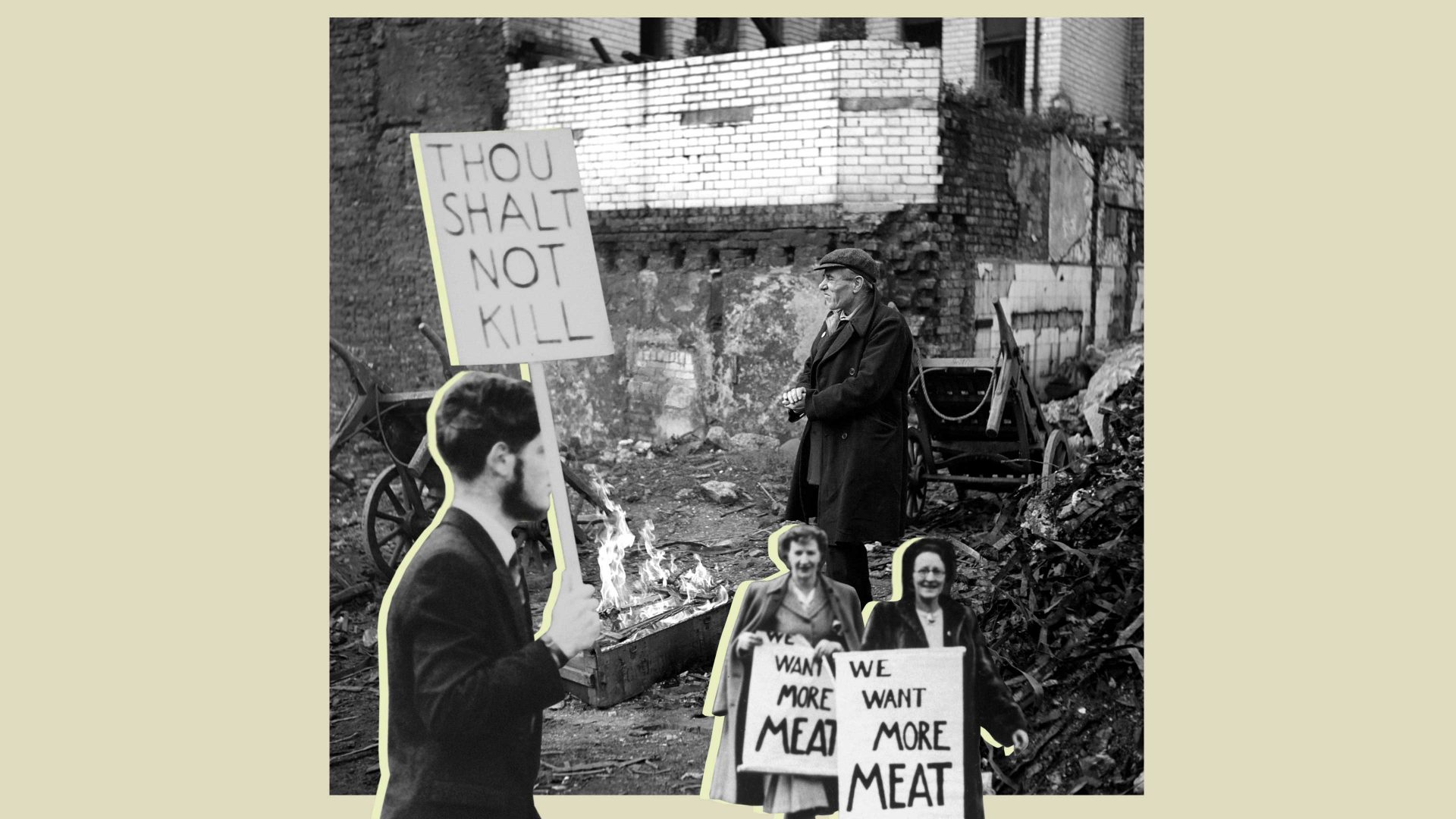Mihas Terletski and his wife, Renata, are working on their dill-scented vegetable patch in the foothills of the Carpathian Mountains. “Careful in the long grass,” warns Renata, “there are snakes!” Once safely inside, Mihas boots up an ancient laptop and clicks on a video. It features a young man with floppy black hair in an old neighbourhood in Lviv. He seems to have forgotten his keys, and after searching all of his pockets in vain, he slumps on to his doorstep.
Seconds later, he springs to his feet and begins to move, stretching out his arms and jauntily cocking his leg. A girl appears from around the corner and joins in the slickly choreographed routine. Then Mihas shows me a recent photograph of his grandson, Roman, a dance student at an academy in the western Ukrainian city who made the film two years ago as part of his coursework. The 22-year-old has acquired a crew cut, a khaki baseball cap and a beard. Mihas thinks his grandson works with drones near the frontline, but he doesn’t know where and has been told not to ask.
On the third day of Russia’s full-scale invasion last February, Roman joined Ukraine’s armed forces. A few months later his father, Bogdan, a 52-year-old veterinarian, also signed up to fight. “I have just one son and one grandson,” says Mihas. “Some people ask why I didn’t do more to stop them, but they were determined to go. Bogdan wanted to be closer to Roman.” Mihas looks drained as he wipes the sweat off his face. He and his wife sleep badly these days. There are no night-time sirens in their small town of Boryslav, but they live in constant dread of the sound of their phones ringing with unwelcome news from the front.
If the majority of soldiers were once volunteers like Roman and his father, growing numbers are now drafted. There are almost one million men in uniform, but the army is hungry for new recruits for its counter-offensive, which began in June. Even those doing useful jobs such as repairing infrastructure or delivering humanitarian aid are asked to register at military offices.
The war is slow, grinding and pitiless. There is a wealth of statistics estimating the number of dead Russian troops. According to the first independent statistical analysis carried out by German academics and independent Russian media, around 47,000 Russians have died so far in the war in Ukraine. Ukrainian intelligence has reported that the Kremlin is building massive refrigeration centres in Kursk and Rostov-on-Don to store thousands of bodies.
Every day, the Ukrainian Ministry of Defence website posts a cumulative total of the number of enemy personnel “liquidated”, alongside tanks captured, aircraft downed and other losses. On July 25 it claimed that 243,220 Russian soldiers had been killed since February 2022. But equivalent figures for Ukrainian casualties are hard to come by in an information environment that is strictly controlled.
Since martial law was imposed at the outset of the invasion, Ukrainian men between the ages of 18 and 60 have been banned from leaving the country. Any man in that age range could theoretically be sent to fight. There are exemptions for full-time carers, students, fathers with three or more children, and people with a so-called beliy bilet or white ticket, considered medically unfit for service. At first, officials could only deliver draft papers to people’s homes where they were officially registered. Sleepovers at friends’ houses became a way of evading conscription.
But new rules mean men can be stopped and questioned about their draft status anywhere, including at work, in shopping centres, on beaches and in the street. Enlistment papers have even been served in churches.
A few men have been conscripted after police intervened in bar-room fights. Others with little appetite for joining the army have fled. At least 90 Ukrainian draft dodgers and deserters are thought to have died trying to escape across the Carpathian Mountains into Romania, where border guards are thin on the ground.
Yet thanks to a mix of patriotism and peer pressure, people remain surprisingly eager to sign up. The army is the most popular institution in the country, and it seems that everyone is keen to support it – if not to fight in it. Artists, accountants, cinematographers and countless others spend hours of their free time tying scraps of brown and green fabric on to string nets. These are used to hide tanks and other military hardware, and camouflage snipers.
Banks, fashion designers, travel firms and restaurants collect money for drones, ambulances, rehabilitation centres and prosthetic limbs. One of the most popular pizza chains in Ukraine is run by army veterans. Everywhere you look there are posters urging people to do their duty. One advert featuring a tough-looking soldier with a mud-splattered face reads: “Turn your rage into a weapon.”
Yuliya Timchenko’s husband, Seriozha, a construction site worker, was desperate to sign up. We meet at her home in Bobryk, an hour’s drive from Kyiv. Russian tanks thundered into their village on March 8 last year. The occupation lasted for three weeks. An armoured personnel carrier was parked right outside Yuliya’s gate. Russian soldiers with machine guns forced the village priest to open the church and allow their snipers access to the bell tower. The invaders cut off the water and shot up the gas pipes.
Every night at around 4am the shelling would start. Yuliya spent most nights in the basement with her mother-in-law and six-year-old son, Zakhar. But Seriozha roamed around the house in a state of fury and refused to take cover.
“He hated them with every cell in his body,” she says. “But we had to calm him down because we all understood that if he touched any of those soldiers, it would make things much worse. They would have destroyed the village and everyone who lives here.”
Comparatively speaking, Yuliya tells me, her family was lucky. Further down the road, houses were looted, people stripped of their jewellery, and one mother and daughter have told police they were raped. When the Russians eventually pulled out, in the next village of Shevchenkove the bodies of six local men were found in a basement; their hands tied behind their backs, gunshot wounds to the head.
Seriozha immediately went to enlist. The first call-up centre rejected him because he had been convicted of a petty crime when he was a teenager. But much to his relief, he was accepted by another office in a nearby town. He was sent to Germany for three weeks of training on heavy artillery systems. Now he moves around some of the hottest conflict zones.
Most days, Yuliya manages a brief conversation or a text exchange with her husband. They communicate via the Starlink internet satellite service. Ukrainian security officials fear the system, founded by Elon Musk, may be vulnerable to Russian hackers. But for Yuliya it is a lifeline. One morning this spring Zakhar woke up sobbing, complaining of a bad dream. She consoled him by getting him to record a voice message to his dad before he left for school. She waited all day for a reply, but none came. Finally, late at night his commander phoned – Seriozha had been caught in a rocket attack. He had rescued a fellow soldier, but suffered a serious concussion and had gone deaf in one ear. He was allowed to come home for a couple of weeks in May. She hadn’t seen him since November.
“For the first two days he didn’t sleep and didn’t eat,” says Yuliya. “He was in a trance, with this awful, empty look in his eyes.” By the time Seriozha regained his appetite, it was almost the end of his leave. Recently Yuliya made cheese dumplings, meat and cabbage pies and sent them to her husband and his fellow soldiers. She uses Nova Poshta, a private postal service with service points very near the frontline. It is not cheap, but it is fast and efficient, and like the satellite service another vital link between soldiers in the field and their families. “The pies were still fresh when they arrived,” she says, smiling for the first time in our conversation. “The lads sent us a video to say thanks.”
Yuliya prays every day for her husband’s safe return, and says her Orthodox faith helps her to cope with his absence. Since last February’s invasion, most parishioners in Bobryk have opted to renounce the Ukrainian Orthodox Church, which many believe is still linked to the Moscow Patriarchate. Instead, they have joined the Orthodox Church of Ukraine, which gained its independence from the Russian church in 2019.
“After the occupation almost everyone wanted this move,” says Yuliya. “There were a few villagers who called us schismatics, but most of us had seen more than enough of their Russkiy Mir (Russian World). And our priest, Father Ioann, told us he’d been thinking about making the switch for a long time. We hated seeing him pushed around at gunpoint.” If her husband makes it back from the war, she vows that she will spend more time with him and her son. “Life is so short,” she says. “We can’t afford to waste it.”
Tens of thousands of families are also waiting for daughters, mothers, sisters and wives to come home. There are more than 50,000 women in the army, 5,000 of them in frontline positions – Ukraine now has one of the most feminised armies in Europe. Above a French restaurant on the outskirts of Kyiv, several volunteer machinists are sewing uniforms. Until recently female fighters had to make do with trousers that kept falling down and boots that didn’t fit properly. Body armour was too heavy and helmets too big, preventing the women from being able to move quickly – a handicap that could prove fatal.
To address these issues and many others, female veterans founded an organisation called Veteranka, which supports the female defenders of Ukraine. The group provides uniforms and gathers crucial supplies such as sanitary products. Olena takes me into another room with about 100 carrier bags on the floor, all destined for women serving in a part of southern Ukraine that suffered devastating flooding after Russia blew up the Kakhovka hydroelectric dam in June.
When the war first began nine years ago in the Donbas, the contribution of female fighters was barely recognised. Female snipers, reconnaissance soldiers, grenade-launcher operators and members of artillery brigades were enlisted as cooks, cleaners, accountants and seamstresses on semi-legal grounds. A survey conducted by the advocacy group Invisible Battalion in 2015 revealed that it was almost impossible for women to get a combat position. Those who volunteered found it hard to access social benefits, military awards or career opportunities in the armed forces. As a result of the campaign, the Ministry of Defence expanded the list of combat positions for women, and in 2018, parliament passed a law on gender equality in the armed forces.
Veteranka put me in touch with Anna Kovalchuk, a 28-year-old blogger for a number of Ukrainian fashion brands, who is often photographed in upmarket resorts and restaurants. Her mother, Tatiana, is an operating theatre nurse with a medical battalion. She has been working on or near the frontline since last autumn.
At the beginning of the war, Tatiana was head surgical nurse at a Kyiv military hospital, before she moved closer to the conflict zone. She doesn’t say much on the phone, because she is not allowed to disclose her location. If she has a lot of wounded people to deal with she just tells her daughters that “things are a bit hot right now”. She gave them a list of people to contact if they don’t hear anything from her for more than a fortnight. Usually, she’s in touch by text and phone several times a week.
Anna was on assignment in Madrid and Barcelona when Russia invaded, but when her mother went to the front, she came home to look after her 15-year-old sister. “A teenage girl really needs her mother – it’s a difficult age. If I were in my mum’s place, I’m not sure that I would make the same choices,” says Anna. “But she told us she had a duty to our country – right now that is the most important thing for her. I am proud she is saving lives.”
Kateryna Brynetska, a teacher from the western city of Ivano-Frankivsk, left her two small children at home with relatives so she could enlist as a riflewoman. When the war in the Donbas began in 2014, she started attending training sessions for volunteers and civilians, and on the first day of the full-scale invasion she joined the queue outside the military commissariat. Two months later, she was sent to the front. Her fellow fighters called her Hummingbird because of her diminutive stature and turquoise-coloured hair. At first, they saw her as a “fifth wheel” and warned her, in a patronising way, to steer clear of the boxes packed with grenades. Before long, though, they had to admit she was an asset to her battalion. Her husband, Denys, is also serving in the army as a combat medic.
Last October, Kateryna told the Ukrainian broadcaster Suspilne that she didn’t want her 10-year-old son, Marko, to inherit the war. “In eight years, he might have to start fighting as well unless we can defeat the Russians and push them out of here. While we have the opportunity, we must do everything to win.”
But there are fears the window of opportunity is closing. The Ukrainian army has long complained it lacks the weaponry needed for significant advances. Russia’s minefields, deep fortifications, heavy artillery and air power have taken their toll, and the counter-offensive is stalling.
With military censorship in force, casualties are notoriously difficult to establish and verify. Last June the defence minister, Oleksii Reznikov, said 100 soldiers a day were dying and 500 more injured. A confidant of Volodymyr Zelensky doubled the daily death toll. But this year presidential advisers have remained tight-lipped. According to reports allegedly leaked from US intelligence sources, an estimated 124,000 to 131,000 Ukrainian soldiers have been killed or wounded – more than five times what Kyiv has publicly disclosed.
I am staying in a friend’s flat in Kyiv, and my neighbour across the landing is a priest named Father Ivan. The first time I hear an air-raid siren I ring on their doorbell, wondering if it is best to run across the square to the nearest metro station or take shelter in the bathroom. He and his wife, Natasha, advise me to stay put.
Later, Father Ivan tells me about a soldier’s funeral he has conducted. Vitya Orlov was a car mechanic who died during an assault in a village near Bakhmut. A few days later, I met his sisters, Lyuba and Natasha. They show me pictures of their little brother doing cartwheels in a field, sitting by a campfire with friends and horsing around with his six-year-old daughter. They tell me Vitya had “golden hands” and could fix anything from car engines to air conditioners to laptops. When he first went to his local military recruitment centre last February, he stood in line all day, but they had no weapons to give out. They were given a gun on the second day and ordered to defend the Kyiv region.
He was sent as far as the Belarussian border and had to clear unexploded shells and anti-tank mines. Then he was assigned to Bucha, the town north-west of Kyiv where Russian troops massacred hundreds of civilians. “When he talked about what he had seen there, his hands were shaking,” says Lyuba. “He just couldn’t believe what the Russians had done to ordinary people, to little kids.”
Vitya was divorced and wanted to remarry and have at least one more child. “He had big plans. Of course, none of us knew that a war would break out and that he would be gone, at the age of 39,” Natasha says. The sisters’ only consolation is that he died instantly when he was hit in the back by a tank shell. But tears spring to their eyes when they describe his body lying face down in a muddy field for nearly four days. “They tried to go and get him several times, but it was too dangerous. There were so many rocket attacks,” says Lyuba.
She opens her handbag and pulls out some documents in a plastic sleeve. The typewritten papers bear a military stamp and a signature, but they are covered in dark brown patches and are hard to read. “That’s his dried blood,” says Lyuba. “They found these papers in his pocket, and I asked Father Ivan to bless them for us. I’ll get them framed. It’s something to remember him by, isn’t it?”




